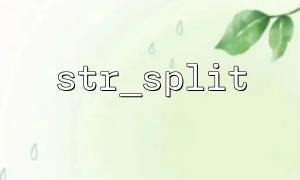In PHP development, the str_split function is a very common function that is used to split a string into an array according to the specified length. Although it's simple to function, we may encounter some debugging issues in some cases. So, how to effectively debug the return value of the str_split function? Here are a few recommended debugging methods.
var_dump() is a very practical debugging function in PHP, which can output detailed information about variables, including data types and values. When debugging the return value of str_split , using var_dump() can help you understand each element in the array.
<?php
$string = "hello world";
$result = str_split($string, 3);
var_dump($result); // Print result details
?>
Output:
array(4) {
[0]=> string(3) "hel"
[1]=> string(3) "lo "
[2]=> string(3) "wor"
[3]=> string(3) "ld"
}
Through the var_dump() output, you can clearly see the array structure returned by str_split and each split string. It helps you check if it is split as expected.
If you want debugging information to be more concise, you can use the print_r() function, which outputs arrays or objects in an easy-to-read format. print_r() does not list data types in detail like var_dump() , but it is sufficient for some simple debugging.
<?php
$string = "php-debug";
$result = str_split($string, 4);
print_r($result); // Output a concise array format
?>
Output:
Array
(
[0] => php-
[1] => debu
[2] => g
)
Through the results output by print_r() , you can quickly view the array returned by str_split to help you confirm whether to split the string as expected.
If you need to check each element of the array one by one, using a foreach loop to print each item in the array is an efficient debugging method.
<?php
$string = "m66.net_php";
$result = str_split($string, 5);
foreach ($result as $key => $value) {
echo "1. $key One element is: $value\n";
}
?>
Output:
1. 0 One element is: m66.n
1. 1 One element is: et_ph
1. 2 One element is: p
With this approach, you can check each element in the array one by one, especially when the array is large or complex, this approach can help you debug more carefully.
In addition to using PHP built-in debugging functions, you can also use some PHP debugging tools to help you view variable values in real time. Commonly used debugging tools such as Xdebug and PhpStorm provide very powerful debugging functions, allowing you to execute code line by line and view the real-time values of variables.
With the debugging tool, you can set breakpoints before or after str_split execution, view the value of $result in real time without adding additional debug output to your code.
Sometimes str_split may be affected by spaces or special characters, resulting in the returned result not meeting expectations. In this case, functions such as trim() or preg_replace() can be used to clean up unnecessary characters in the input data.
<?php
$string = " m66.net ";
$string = trim($string); // Remove the blank space before and after
$result = str_split($string, 4);
print_r($result);
?>
Output:
Array
(
[0] => m66.
[1] => net
)
During the debugging process, ensuring that the data format meets expectations can avoid many debugging problems caused by input errors.
Through the above debugging methods, you can more efficiently troubleshoot and debug the return value of the str_split function in PHP. In the actual development process, using these methods reasonably can help you quickly locate problems and improve debugging efficiency. Hope these suggestions help you!















